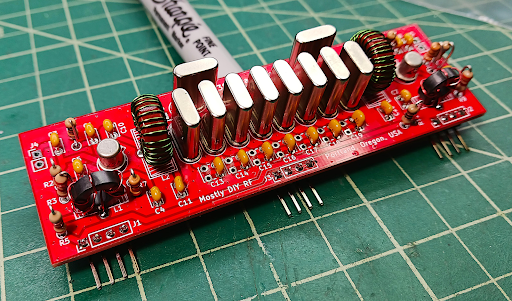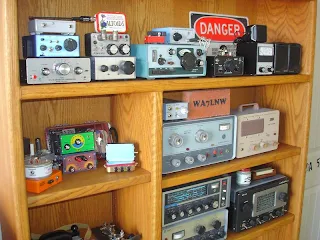Bill's DXCC-100. DONE.
Tribal Wisdom: W1REX on HRWB https://soldersmoke.blogspot.com/2023/11/listen-to-rex-w1rex-lots-of-tribal.html
Pete's Bench:
Pete's 6BA6 rig
Pete Re-invents the Shirt-pocket SSB Rig
BEZOS BUCKS ARE BACK! PLEASE BUY THERE! >>>>>>>>>>>>>>>>>>>>>>>
Mostly DIY RF: Work proceeds in the Oregon Silicon Forest on P3ST kit development. Todd is confident the P3ST will be released on December 18th.Many other kits available now: https://mostlydiyrf.com/
Sign up for the newsletter: https://mostlydiyrf.com/subscribe/
Rebuild of the 15-10 VFO (for improved Dial Spread) (with yet another QF-1 capacitor) https://soldersmoke.blogspot.com/2023/10/dial-scale-linearity-spreading-out.html
Why Building for 10 meters is harder: https://soldersmoke.blogspot.com/2023/09/why-building-for-10-meters-is-harder.html
Copper Tape shielding of 15-10 rig.
Crushing Spurs with Better Bandpass Filters (see blog post) https://soldersmoke.blogspot.com/2023/09/crushing-17-and-12-meter-spurs-with.html
Another 15-10 rig in the works... for SSSS. Boards are accumulating...
More problems discovered with the Herring Aid 5 Receiver . Lots of SS blog posts Comment from Rick WD5L. ) https://soldersmoke.blogspot.com/2023/10/a-big-error-discovered-in-1976-qst.html Did you try to build one? Did you succeed or did you fail? Please let us know.
The Basil Mahon books (blog posts) https://soldersmoke.blogspot.com/2023/11/basil-mahon-is-author-for-us-he.html
The Sunburst and Luminary book of Don Eyles (blog posts)
The Art of Electronics by Horowitz and Hill (blog posts)
Spectrum Analysers: Tiny SA Ultra https://soldersmoke.blogspot.com/2023/09/the-tinysa-ultra-spectrum-analyser-video.html and Polarad 632C-1; George WB5OYP gave me one of these spectrum analysers (I NEED a manual! Does anyone have a manual or a schematic? ) :
Stabilizing the EB63A (with Pete recommended LP filters from e-Bay.
MAILBAG:
TRANSISTOR MAN T-SHIRTS! Thanks to Roy WN3F!
Todd VE7BPO on AF amplifiers. Thanks Todd.
Wes W7ZOI -- Always a privilege to exchange e-mail with Wes.
E-mail from Jay Rusgrove W1VD. About the Herring Aid 5.
E-mail from Eamon Skelton EI9GQ! Amazing!
HB2HB with Denny VU2DGR https://soldersmoke.blogspot.com/2023/09/hb2hb-contact-with-denny-vu2dgr.html
Nick M0NTV on diode matching for ring mixers: https://soldersmoke.blogspot.com/2023/10/does-matching-matter-diode-matching-for.html
Paul Taylor VK3HN on the new Elecraft CW rig.
Dean KK4DAS fixed the noise in his Hallicrafters SW receiver. A long battle, finally won.
Dean also in contact with G3UUR.
Ramakrishnan VU2JXN helping me set up a backup of blog on WordPress.
Mark KA9OOI noticed that SS podcast archive appears gone. In fact just temporarily relocated to http://soldersmoke.com/
(SS PODCAST Archive temporarily relocated to http://soldersmoke.com/
Andreas DL1AJG - Crystal radio video. https://soldersmoke.blogspot.com/2023/10/building-crystal-set-videos.html
George N2APB on the Herring Aid 5
Grayson KJ7UM experimenting with Varactors and Thermatrons!
Thomas K4SWL on Mattia's DC receiver. https://soldersmoke.blogspot.com/2023/10/mattia-zamanas-amazing-direct.html
Bob Weaver of Dial Bandspread Linearity fame. Electron Bunker
Mike Bryce WB8VGE QRP Hall of famer -- he too couldn't get the Herring Aid 5 working.
Kirk NT0Z wrote about the Wayback machine. But this former ARRL staffer he also tried and failed to get the Herring Aid 5 going. Way back when... https://soldersmoke.blogspot.com/2015/03/kirks-herring-aid-tuna-tin-and-regen.html






.jpg)









